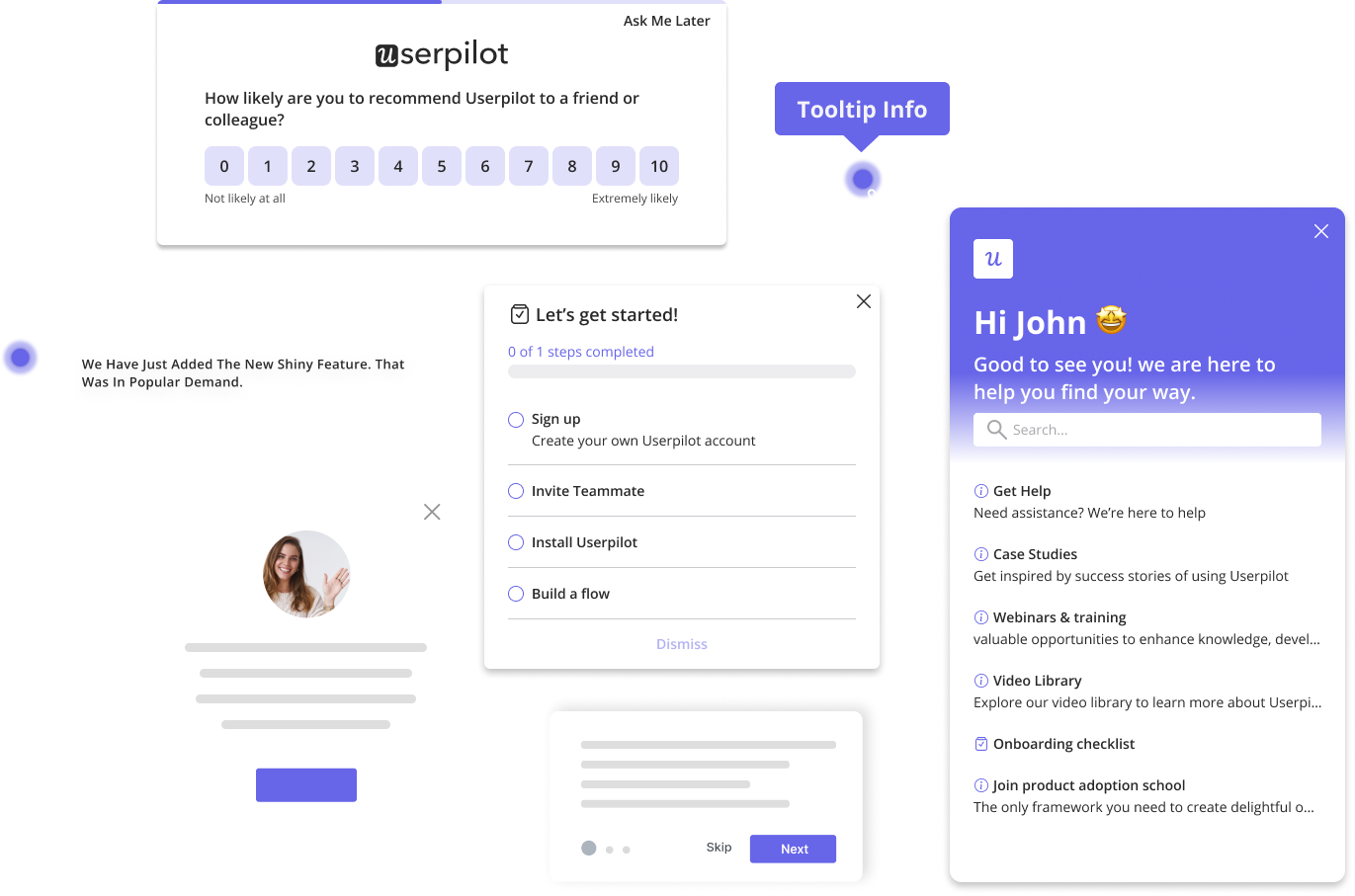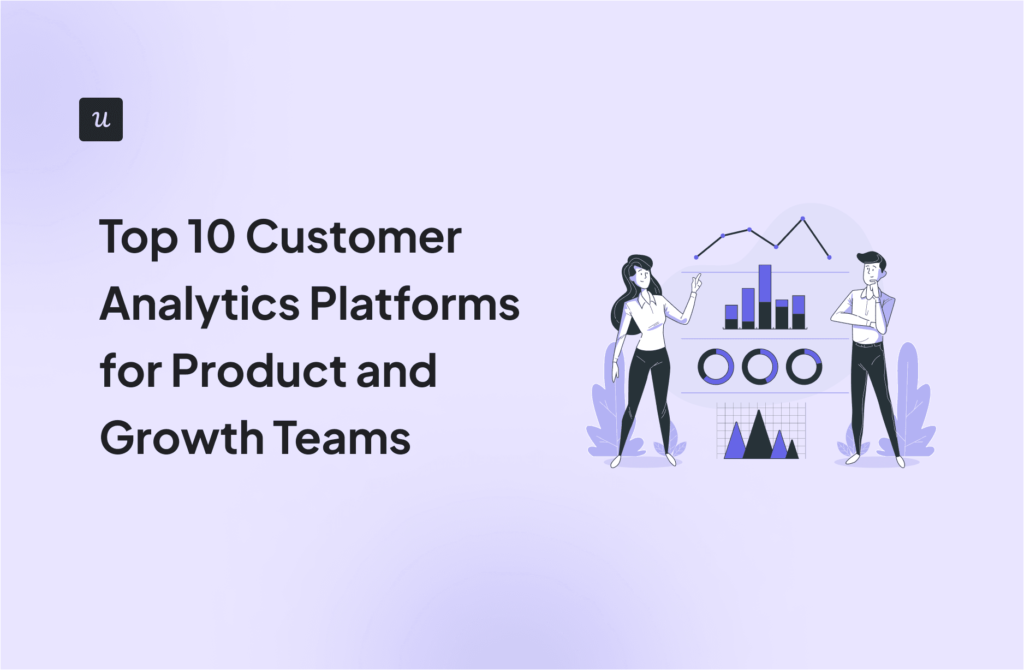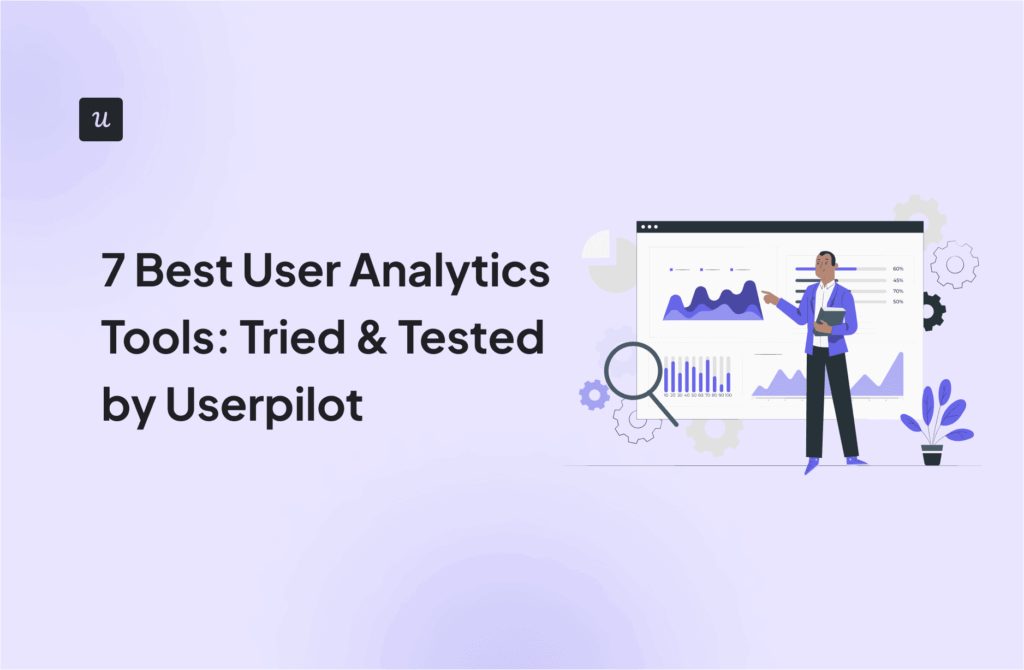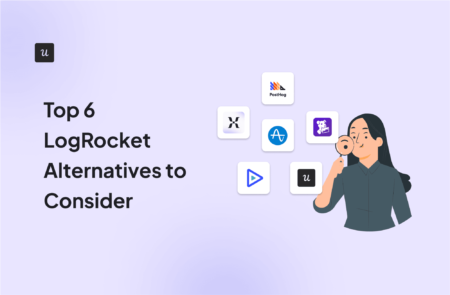
While LogRocket excels at session replays, it might not be the most comprehensive solution for all your analytics needs. If you’re looking for advanced features like A/B testing, or infrastructure monitoring, you might need to look into LogRocket alternatives.
Luckily, there are several tools available that offer advanced tools for user behavior tracking, performance monitoring, and product analytics.
To make more data-driven decisions, let’s explore the top 6 alternatives to help you achieve that goal!
Try Userpilot Now
See Why 1,000+ Teams Choose Userpilot

TL;DR
- LogRocket’s main functionality focuses on detecting and diagnosing front-end technical issues through detailed session replay, error tracking, and product performance monitoring.
- Consider LogRocket alternatives if you require advanced behavioral data analytics, like A/B testing, sentiment analysis, and in-app follow-ups, or if you need a solution with a quick, no-code setup.
- Here are 6 cloud-based solutions you should explore instead of LogRocket:
- Userpilot offers advanced user feedback collection, customizable surveys, low-code/no-code analytics, and user engagement tools like in-app messaging.
- Mixpanel provides robust event analytics with features like funnel analysis, cohort analysis, A/B testing, and customizable analysis reports and dashboards.
- Amplitude excels in mobile and web analytics, offering deep behavioral insights, user journey mapping, A/B testing, and customizable dashboards.
- Datadog delivers comprehensive performance monitoring, real-time observability, infrastructure metrics, and log management.
- PostHog focuses on product analytics with built-in feature flagging, integrated session replays, heatmaps, and in-app surveys for user feedback.
- OpenReplay specializes in session replays and error tracking for analyzing user needs, with integrated error monitoring and advanced session filtering.
- Ready to track and analyze user behavior with the right analytics tool? Schedule a Userpilot demo and see how you can get started.
What are LogRocket’s main features?
- Session replay: Records user experience interactions with your app or site for you to revisit and replay later to identify and determine front-end issues.
- Error/bug tracking & reporting: Captures and reports detailed information on JavaScript errors and front-end issues. This includes context, stack traces, and customer interactions leading up to the bugs,
- Application performance monitoring (APM): Tracks and evaluates frontend performance and response time to identify and resolve issues. Commonly tracked metrics include web vitals, memory usage, network speed, and page load times.
- Network request logging: Monitors and logs API calls and responses to diagnose issues with data fetching and handling.
- Behavioral insights: Examines and visualizes interactions and navigation patterns to provide a clear analysis of user behavior. This includes features such as eye tracking, click tracking, mouse movement, and frustration tracking.
- User information identification: Captures the IP address of every session per user, along with information on which browser the user is using, for browser-specific troubleshooting.
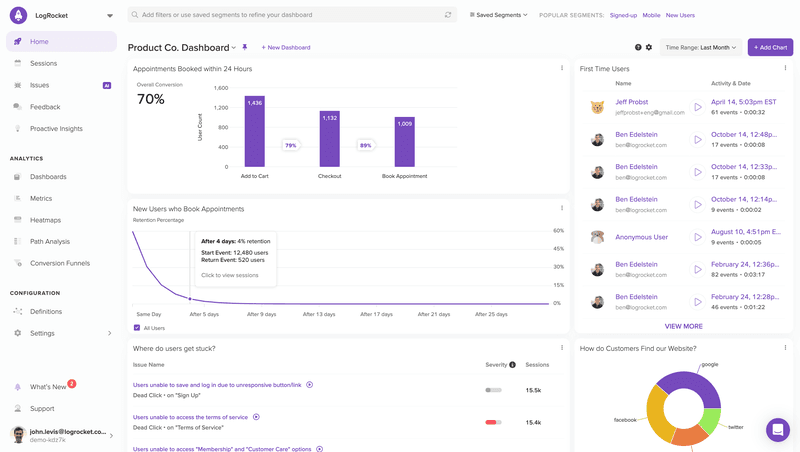
When do you need a LogRocket alternative?
LogRocket is a tool mainly meant for detecting front-end technical issues. As such, its basic features may not meet your advanced analytics needs. Let’s go over some common instances when LogRocket won’t suffice to help gauge if you need to consider other Logrok alternatives.
- Limited behavioral analytics: LogRocket offers basic behavioral analytics features, lacking fundamental functionalities like A/B testing or sentiment analysis, etc. Instead, you need more robust software that is specifically designed for your job to be done.
- Actionable customer feedback: You need an alternative if you’re looking to not only collect customer feedback and data but also act on it. For instance, you might want to scale in-app follow-ups with users having onboarding issues.
- Technical resource demands: LogRocket requires you to insert lines of code into your app for almost every new functionality, which can be challenging for teams with limited technical resources.
- No-code setup preference: Similarly, if you prefer a quicker, no-code analytics approach, then LogRocket’s hands-on setup isn’t for you.
Top 6 LogRocket alternatives by use cases
As you’ve seen, LogRocket is not the right tool if you’re looking to understand and analyze customer behavior. So, to help you find a product analytics tool that better fits your use case, here are the 6 best LogRocket alternatives you should explore.
Userpilot for analyzing user feedback and user interactions
Userpilot is an all-in-one platform designed for product teams, offering comprehensive tools for both user engagement and product analytics. With its robust features, Userpilot enables teams to easily collect and analyze user feedback and interactions effectively.
The reliable platform boasts a strong G2 rating of 4.6 out of 5 stars, reflecting its effectiveness and user approval in the market.
Main features
- Compared to LogRocket’s lack of user surveys, Userpilot offers advanced survey functionality. It provides customizable survey templates, multiple survey types, sentiment analysis, and trigger conditions.
- LogRocket requires you to integrate lines of code, making it harder to adopt the tool. In contrast, Userpilot provides low-code and no-code analytics features, catering to a wider audience.
- Getting set up with Userpilot is much easier since features such as auto-capture are available by default.
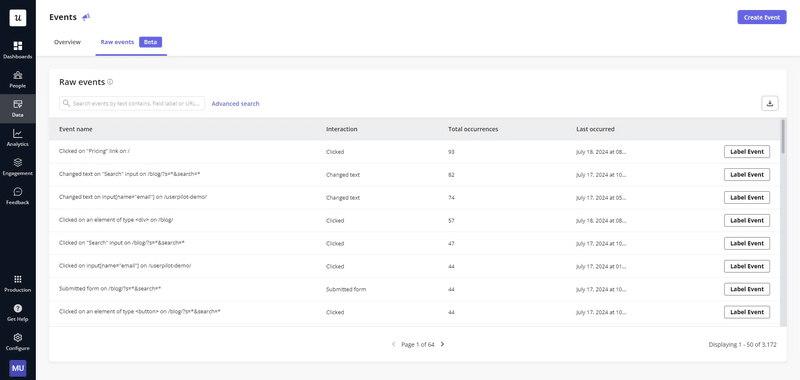
- Userpilot also includes no-code reports for all your product analytics needs. These include funnel, path, trend, and retention analysis reports. There are also no-code analytics dashboards with templates and customizable options.
- You can also perform user analytics with user and account profiles—a feature that is especially beneficial for SaaS companies.
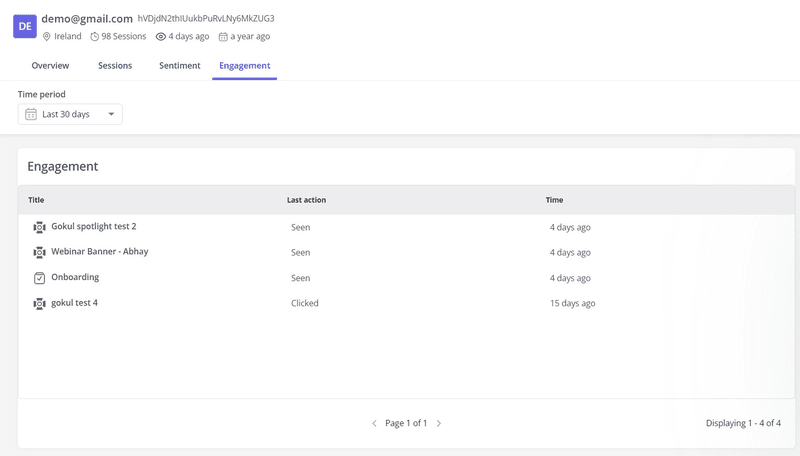
- There is a whole array of engagement features. These help you act on collected data, such as triggering in-app messages based on specific user properties and events.
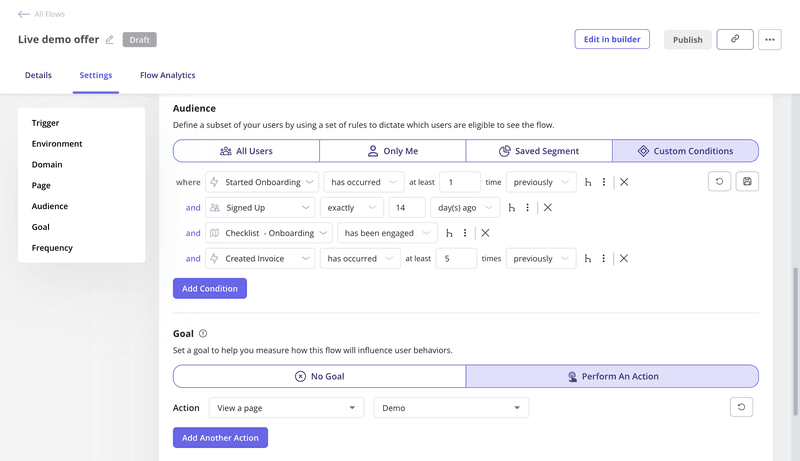
In short, with Userpilot, you can unlock a more holistic view of users and their behavior compared to LogRocket.
Pricing
Userpilot offers transparent, scalable pricing designed for SaaS businesses at different stages of growth. Plans start at $299/month and go up to a fully customizable Enterprise tier for larger organizations with advanced needs.
Even the entry-level plan includes access to all UI patterns and provides the essential tools most mid-market SaaS teams need to drive product adoption from day one.
Here’s a breakdown of the three paid plans:
-
Starter – $299/month (billed annually): Designed for teams getting started with product adoption, the Starter plan includes segmentation, product analytics, reporting, in-app user engagement, NPS feedback, and UI customization.
-
Growth – Custom pricing: Ideal for scaling teams, the Growth plan adds features like resource centers, advanced event-based triggers, unlimited feature tagging, AI-powered content localization, EU hosting options, and a dedicated Customer Success Manager.
-
Enterprise – Custom pricing: Built for large organizations with complex requirements, the Enterprise plan includes everything in Starter and Growth, plus custom roles and permissions, premium integrations, priority support, custom contracts, SLAs, SAML SSO, activity logs, security audits, and SOC 2/GDPR compliance.n.
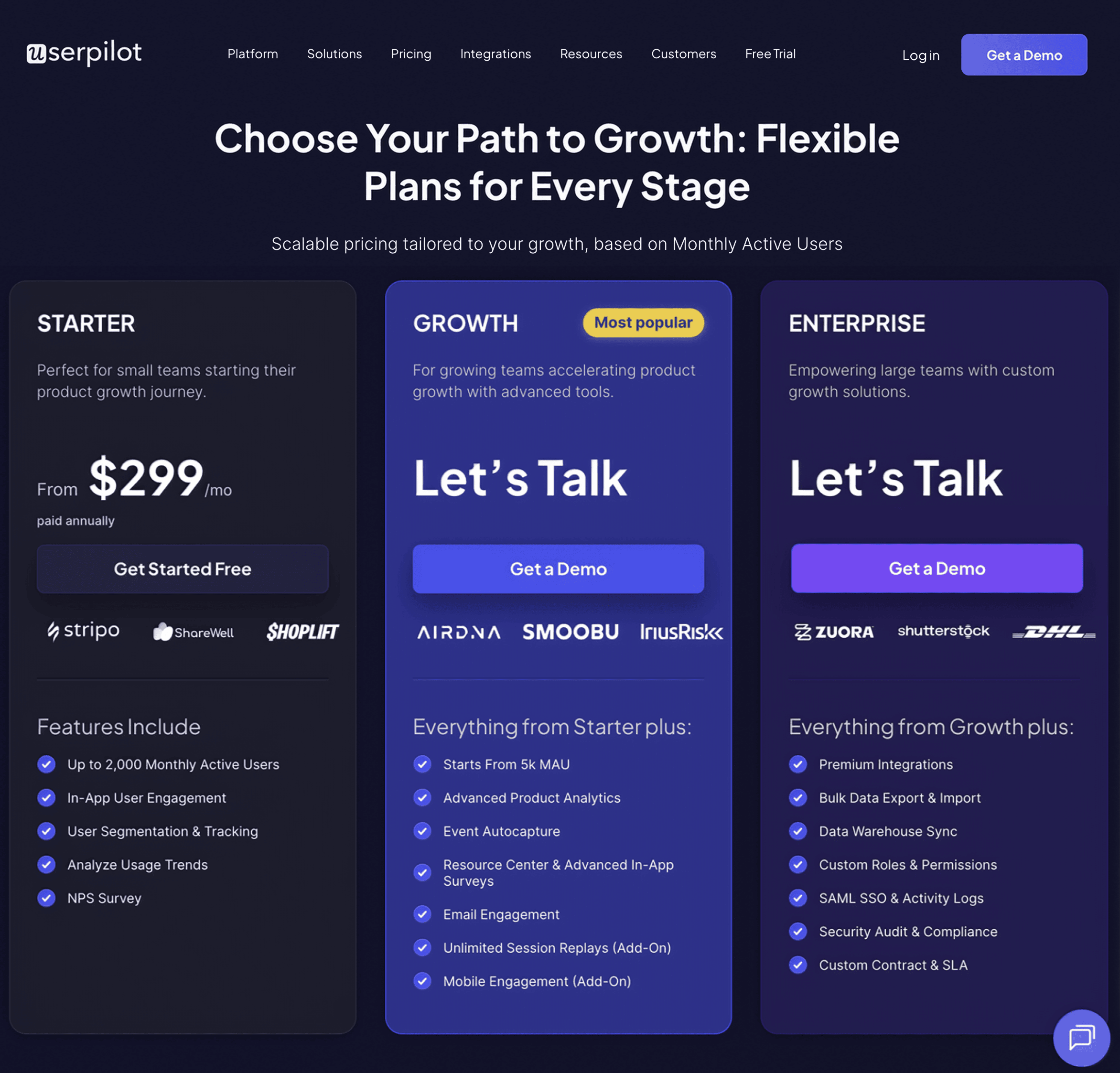
Mixpanel for real user monitoring
Mixpanel is a powerful tool for event analytics designed for tracking interactions across your website, product, and mobile app. It holds a solid G2 rating of 4.6 out of 5 stars, highlighting its popularity among users.
Main features
- Mixpanel provides advanced behavioral analytics with features such as funnel analysis, cohort analysis, and user segmentation for deeper insights into engagement. Whereas LogRocket only centers on session replay and front-end issue tracking.
- Mixpanel offers customizable reports and provides an analytics dashboard for easy data visualization as well. This differs from LogRocket, whose reporting focuses on error reports.
- Mixpanel also includes features like A/B testing, user paths, and retention analysis to understand how users interact with your product.
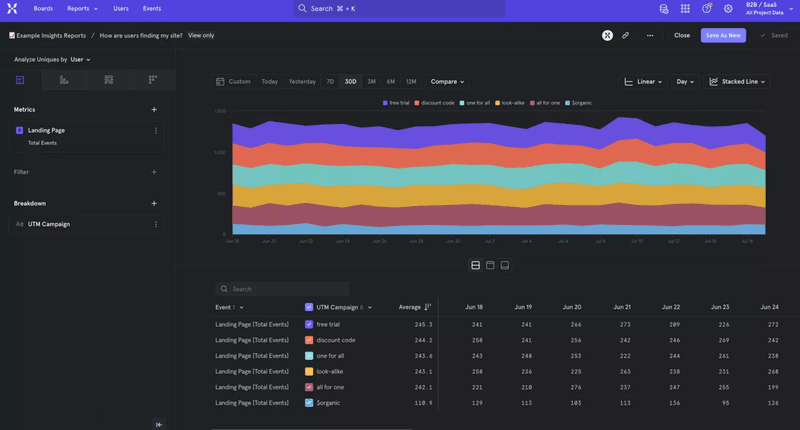
- While LogRocket does not offer mobile app analytics, Mixpanel extends all these capabilities for mobile apps too.
Pricing
Mixpanel’s pricing is based on events per month. It offers 3 pricing tiers, with the first counting as a free trial of sorts, allowing up to 20 million monthly events. Next is the Growth tier, starting at $28/month for 10 thousand monthly events. Lastly, the Enterprise tier offers customizable pricing plans.
Startups that meet certain criteria can enjoy the Mixpanel Growth plan for free for a year. This makes the product a good choice for smaller companies and startups especially.
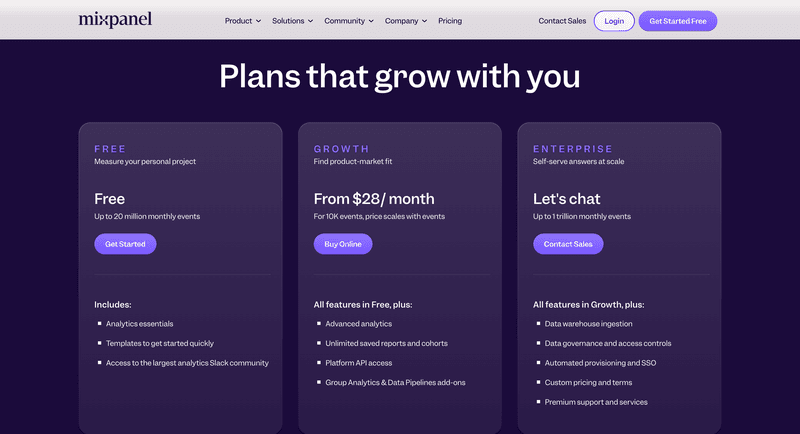
Amplitude for mobile apps and web analytics
Amplitude is a top analytics platform for mobile and web apps, offering tools for tracking user actions, analyzing behavior, and optimizing performance. The tool has an impressive G2 rating of 4.5 out of 5 stars.
Main features
- In contrast to LogRocket, Amplitude offers in-depth user analytics. This includes funnel analysis, cohort analysis, and user segmentation for understanding behavior.
- The behavioral analytics features in Amplitude surpass those provided by LogRocket. Amplitude includes advanced features like A/B testing, Amplitude pathfinder for user flows, and retention analysis for improving the user experience.
- Amplitude provides in-depth user retention metrics and churn analysis. Whereas LogRocket focuses more on debugging and session recording rather than long-term user retention.
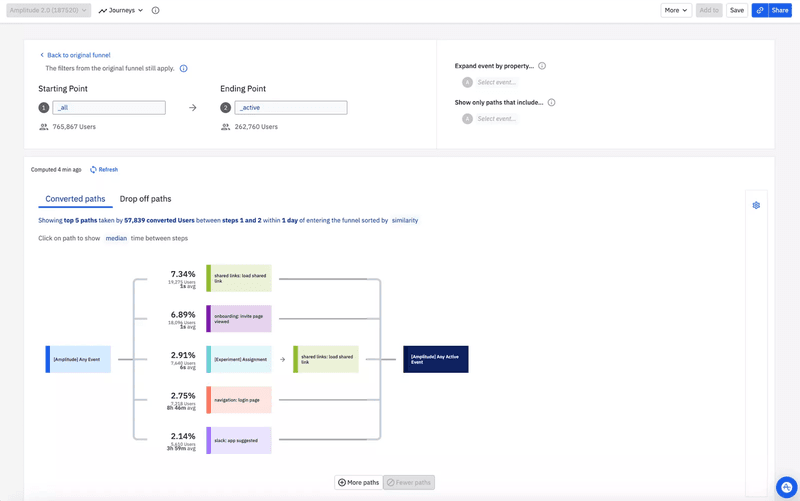
- LogRocket’s interface centers on session replays, with limited customizability to the dashboard. However, Amplitude allows for customizable dashboards and reports for various engagement and usage metrics.
- Lastly, Amplitude includes tools for mapping and analyzing user journeys across different touchpoints, something LogRocket lacks.
Pricing
Amplitude’s pricing offers 3 tiers, with the Starter tier being a free plan. This is followed by the Plus plan, starting at $49/month, for small teams. Lastly, there’s the Growth plan, offering customizable pricing for larger teams.
It also offers one year of free use to startups meeting certain criteria. Overall, Amplitude is a cost-effective option for smaller teams, freelancers, and startups.
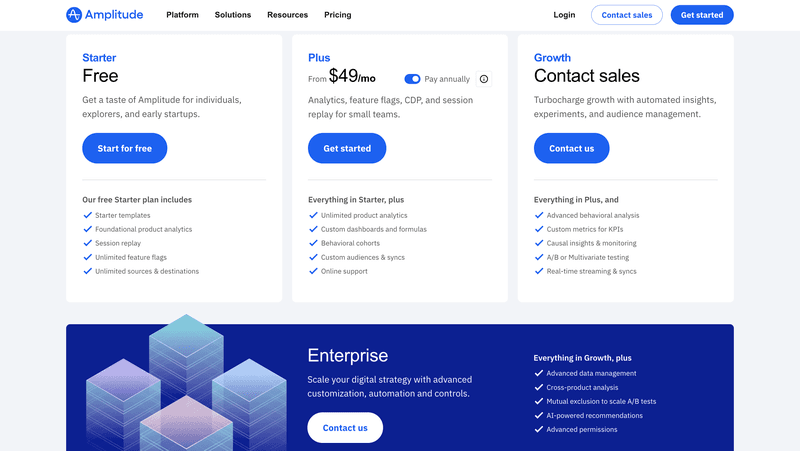
Datadog for performance monitoring
Datadog is a comprehensive performance monitoring tool that provides real-time observability across applications, infrastructure, and logs. It stands at a strong G2 rating of 4.4 stars out of 5.
Main features
- Datadog specializes in performance monitoring with real-time metrics and infrastructure monitoring, making it a good option for behavior analytics. LogRocket offers no such functionality.
- A key differentiating factor is Datadog’s extensive array of infrastructure metrics and monitoring, including server and cloud resource usage. This is a domain that LogRocket does not cater to.
- The two also differ in terms of application performance management (APM). Datadog includes capabilities to track backend performance, while LogRocket focuses on client-side session recordings instead.
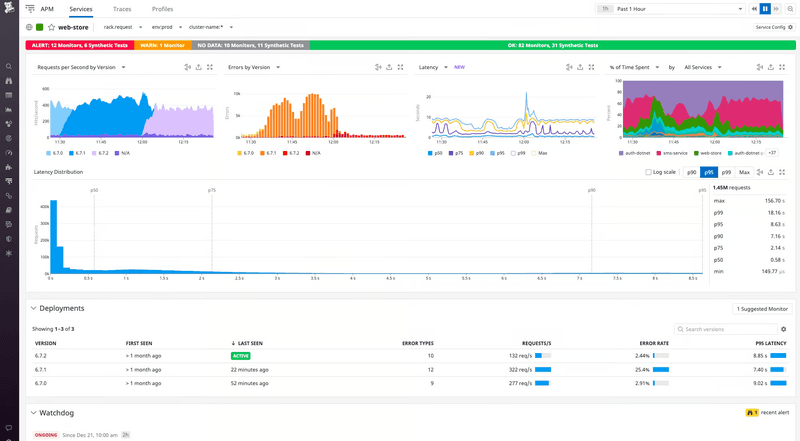
- Datadog integrates log management with its performance monitoring, allowing for comprehensive analysis of logs. In contrast, LogRocket offers limited logging capabilities.
- Lastly, while LogRocket’s dashboards revolve around session insights, Datadog provides customizable dashboards and alerts for infrastructure and performance metrics.
Pricing
Datadog is perfect for smaller businesses and startups looking for a tool to scale with them as they grow. It offers a Free plan with 5 hosts, followed by the Pro plan at $15/host/month. The Enterprise plan starts at $23/host/month.
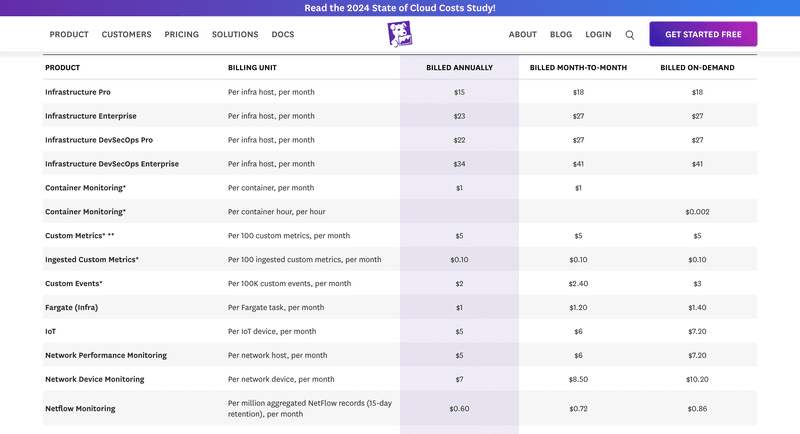
PostHog for customer feedback and user analytics
PostHog is among the top Logrocket alternatives designed for developers and engineering teams to help them improve products by capturing events and performing product analytics. As such, product teams might find it harder to adopt PostHog. Despite this, the tool has received a good G2 rating of 4.4 out of 5 stars.
Main features
- PostHog offers built-in feature flagging, supporting experimentation like A/B testing and allowing for targeted and gradual feature rollouts.
- Both platforms provide session recording. However, PostHog integrates session replays with its analytics dashboard, enabling users to analyze recorded sessions alongside behavioral data.
- Data visualization becomes easier with PostHog, which includes heatmaps for visualizing product interactions, which LogRocket lacks.
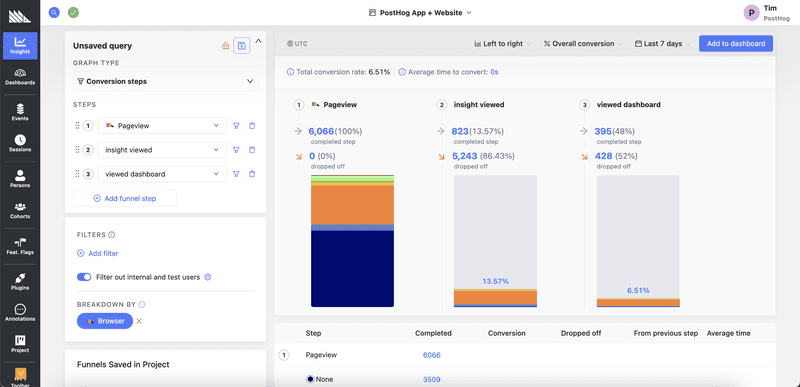
- PostHog supports in-app surveys and feedback collection, allowing users to gather direct feedback from within the application. In contrast, LogRocket does not have dedicated user feedback features.
Pricing
PostHog follows usage-based pricing, with a free forever tier to start. Next is the Ridiculously Cheap plan at $0/month, but you pay for added services after maxing out your projects. Lastly, there’s the Starship Enterprise from $2,000/month.
The pricing makes it a solid choice for startups, freelancers, and smaller businesses.
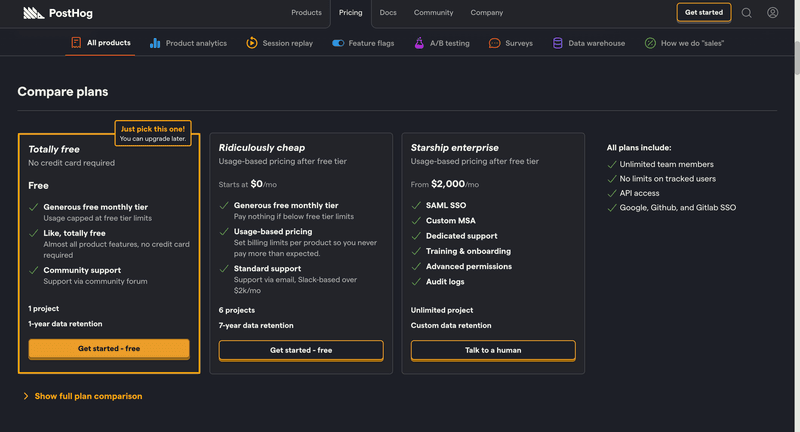
OpenReplay for user behavior and error tracking
OpenReplay offers a comprehensive solution for user behavior and error tracking, although it currently does not have a G2 rating. The platform enables session recordings and replays, product analytics for insights into user needs, and helps identify and resolve errors efficiently.
Main features
- Both OpenReplay and LogRocket include error-tracking features. However, OpenReplay integrates error monitoring and tracking with session replays for a more unified view of user problems, whereas LogRocket does not.
- OpenReplay provides advanced filtering options to sort and analyze user sessions based on various criteria. These include user actions, error occurrences, performance metrics, etc. LogRocket lacks such an extensive range of filters.
As far as LogRocket alternatives go, there isn’t much difference between OpenReplay and LogRocket. Both tools offer the same capabilities in terms of session replays and also lack in similar domains. For example, both don’t provide heatmaps or built-in user feedback and engagement tools.
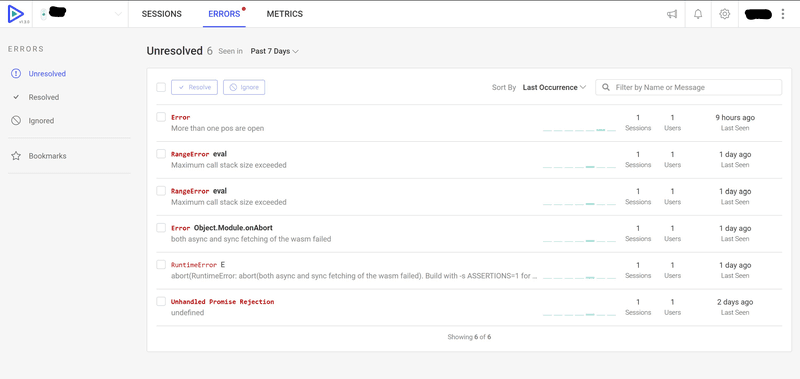
Pricing
OpenReplay offers a free tier with 1,000 sessions/month. Next is the Pay-as-you-Go plan at $5.95 per 1,000 sessions/month. Both these are serverless plans. For cloud-based solutions, the Dedicated plan starts at $199/month. There is also a 7-day free trial available for the two paid plans.
For self-hosting options, a customizable Enterprise plan is available. This diverse pricing makes OpenReplay ideal for all organization sizes, from small to large businesses.
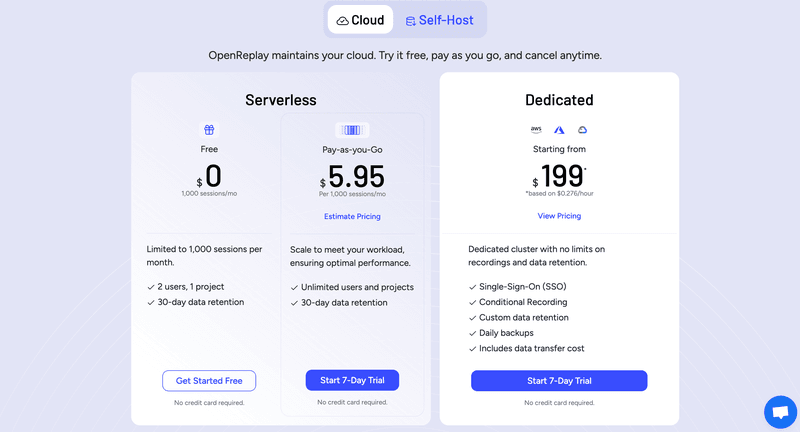
Conclusion
If LogRocket falls short in addressing your specific analytics needs, we hope these alternatives provide the tailored solutions you’re looking for.
Looking for an all-in-one solution so you act on collected data? Get a Userpilot Demo and see how we can help.

